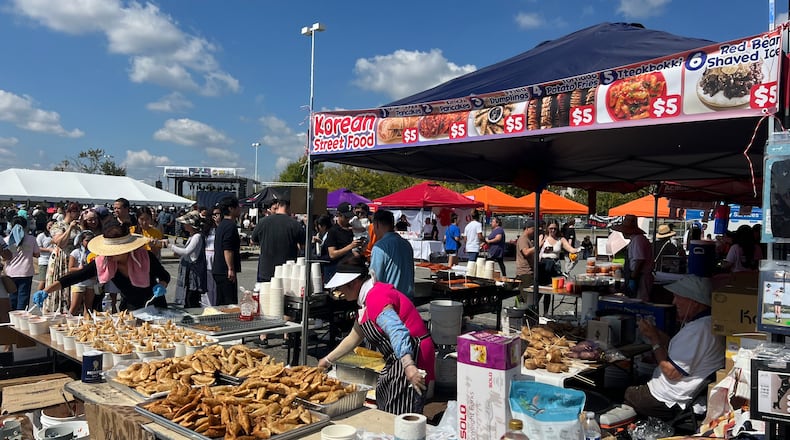The South Korean government, which has largely focused its efforts promoting Korean culture and tourism in greater New York City and Los Angeles, is now looking South.
Two events last weekend drew tens of thousands of Korean Americans and non-Koreans with a love of Korean food and music to Lawrenceville, which hosted metro Atlanta’s largest Korean festival; and to Ponce City Market, where the Korea Tourism Organization hosted its first pop-up event.
South Korea has become Georgia’s top foreign investor in recent years, and as the state’s Korean American population and mainstream interest in K-pop boom, the Korean government is looking to use the momentum to take K-fever up a notch in the South.
“There are more and more Korean people and Korean companies in Georgia, and K-culture is booming here,” Korea Tourism Organization’s New York Deputy Director, Hyeri Choi, said. “We want to keep the momentum going and expand our marketing strategy to go beyond just L.A. and New York.”
The 2020 U.S. Census recorded more than 71,000 Korean Americans living in Georgia. Since then, the population has more than doubled to top 150,000 according to Sangpyo Suh, the Consul General of South Korea in Atlanta. Atlanta has also become a major hub for K-pop fans as the only Southeast stop for many K-pop concerts in the U.S. Some restaurant owners said the K-pop craze in Atlanta has driven higher demand for Korean food in the city.
Korea Tourism Organization, part of South Korea’s Ministry of Culture, Sports and Tourism, held its first K-Tourism Roadshow pop-up at Ponce City Market featuring Korean dishes like kimchi, ramen and tteokbokki and a K-pop dance competition.
This is the first of many events that the government plans to host in Georgia, Choi said.
Credit: Korea Tourism Organization
Credit: Korea Tourism Organization
Happening 25 miles northeast of Ponce City Market was the 2024 Korean Festival where hundreds of vendors filled the parking lot of Sugarloaf Mills. The event featured games and street food, booths selling K-beauty and skin care products and Korean medical stalls where attendees could get blood pressure readings and acupuncture treatments.
After playing Tuho, a traditional Korean game of throwing arrows into a pot, Christina Purgason and her family enjoyed kimchi and potato pancakes, Korean glass noodles called japchae and a sweet Korean dessert called hotteok.
“I’m a vegetarian, so we love making Korean dishes like sundubu jigae (soft tofu stew) and japchae at home,” said Purgason. “K-pop is also big in our family.”
Organizer Kim Baik-kyu attributes much of the festival’s success to the popularity of K-pop and K-food among non-Koreans.
“Last year, we had about 40,000 people,” Kim said. “This year, it’s about 50,000 and the continued growth is thanks to the young people interested in K-pop and K-culture.”
Credit: Ashley Ahn
Credit: Ashley Ahn
Mark Pagnozzi said the festival was an unexpected opportunity to get COVID, flu and tetanus shots and get his shoulder examined by a traditional Korean medicine doctor.
“I’ve been to other festivals but nothing of this scale,” he said. “It’s like I’m getting a full health check up while I’m here.”
Pagnozzi visited South Korea with his wife, whose grandmother is from South Korea, in 2019 where he discovered his love for Korean cuisine. Pointing to a food stall where Korean vendors were frying dumplings and mixing a tub of tteokbokki, he said, “That’s exactly what I saw at Namdaemun Market.”
The Korean government has also noticed the voracious appetite for Korean food and culture in Georgia, particularly as major Korean companies like SK Group and Hyundai invest billions to open factories in the state. Delta and its partner Korean Air have added flights to its schedule and now offer three daily from Atlanta to Seoul.
“We want to connect with Korean companies who probably want to help send their employees to Korea to visit family and friends,” Choi of Korea Tourism Organization said.
Stefanie Kovacs is an elementary teacher in Marietta and says she plans to start celebrating Asian American, Native Hawaiian and Pacific Islander Heritage Month with her class next year, gaining inspiration from the festival in Lawrenceville.
“When I went to Kennesaw State University around 2012, I couldn’t find a single Korean restaurant,” she said. “Now, they’re everywhere.”
About the Author
Keep Reading
The Latest
Featured





